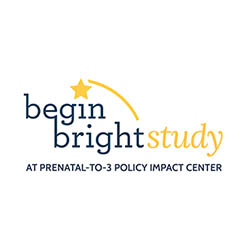First Annual Prenatal-to-3 State Policy Roadmap Offers Clear Path for Policymakers Looking to Build Strong Early Childhood Systems Amidst COVID-19 Recovery
AUSTIN, Texas – Sept. 15, 2020 – The health and wellbeing of infants and toddlers vary widely by state, but evidence shows there are clear policy pathways to strengthen equity and outcomes, according to a new annual Roadmap released today by the Prenatal-to 3 Policy Impact Center at The University of Texas at Austin LBJ School of Public Affairs.
The Prenatal-to-3 State Policy Roadmap—a groundbreaking, first-of-its-kind look at the research-proven policy solutions that support the health and wellbeing of young children—shows where states stand when it comes to key areas that impact the most sensitive period for young children’s developing brain and body. It takes a comprehensive look at the needs of infants, toddlers, and their families and is designed to provide clarity for policy actions and better outcomes in early health, maternal care, family life, economic security, and early care and learning.
It also provides states a clear pathway to build strong systems as they build back from the COVID-19 era and work to improve outcomes for young children. The Roadmap outlines five policies and six strategies that research shows are most effective in fostering the nurturing environments infants and toddlers need and reducing long-standing disparities in outcomes among racial and ethnic groups and socioeconomic status.
“While the science is clear on the conditions necessary to help children thrive during their earliest years, state leaders previously lacked clear guidance on which policies were most effective to create those conditions,” said Dr. Cynthia Osborne, director of the Prenatal-to-3 Policy Impact Center and associate dean of the LBJ School. “It’s more important now than ever, as more families are in crisis, that states have an evidence-driven tool to develop policy solutions that strengthen outcomes and equity for their youngest children.”
The Roadmap reveals that while some states are making progress with the adoption of the 11 combined identified solutions, not one state has adopted them all.
The five effective policies identified in the Roadmap include: expanded income eligibility for health insurance, reduced administrative burden for SNAP, paid family leave, state minimum wage, and state earned income tax credit. The six effective strategies identified include comprehensive screening and referral programs, childcare subsidies, group prenatal care, evidence-based home visiting, Early Head Start, and Early Intervention services.
The results also show that access to services varies substantially across racial and ethnic groups, exacerbating inequities in overall wellbeing between children of color and their White peers. These racial and ethnic disparities are the result of policy choices and long-standing racism. Eliminating the disparities should be a goal shared by every state.
“In America, no child’s opportunities should be constrained because of their background, race, or where they live. But as we face the triple threat of a global pandemic, the economic fallout from the health crisis, and a national reckoning on hundreds of years of racial injustice, it’s painfully clear that our babies—particularly babies of color and babies from low-income backgrounds—are falling through the cracks of a patchwork early care and education system,” said John B. King, Jr., 10th U.S. Secretary of Education and president and CEO of The Education Trust. “This report is groundbreaking in that it provides policymakers with a clear, research-driven roadmap of policies that states can, and should, consider to begin the hard work of eliminating inequities and building a stronger early childhood system for our babies and their families.”
Only three states—California, District of Columbia and New Jersey—are fully implementing all five effective policies, and no state is making substantial progress toward implementing all six effective strategies.
Seven states have not fully implemented any of the Roadmap policies—Florida, Georgia, Mississippi, North Carolina, South Carolina, Texas, and Wyoming—and 15 states have not made substantial progress toward implementing any of the Roadmap strategies.
Three states—Florida, Mississippi, and Wyoming—have not fully implemented any of the 11 Roadmap policies or strategies that strengthen the prenatal-to-3 system of care.
The period from prenatal development to age 3 (PN-3) is the most critical time period for the developing brain and body, and one that lays the foundation for all future learning, behavior, and health. Right now, this is more important than ever – often those most affected by issues of health disparities, racism, and societal inequities are our youngest children. The stress has consequences. Research shows a direct correlation between early adversity in infants and toddlers and poor outcomes later in life.
“Science is telling us that better outcomes for very young children facing adversity can be achieved by strengthening caregiver-child relationships, reducing stresses on families, and building core skills in the adults who care for young children,” said Dr. Jack P. Shonkoff, member of the Prenatal-to-3 Policy Impact Center National Advisory Council and director of the Center on the Developing Child at Harvard University. “The Policy Impact Center and the annual Roadmap provide a powerful platform for making these scientific insights actionable by informing wise, state-level investments that produce greater impact at scale.”
The Roadmap will be updated annually. While it will take years for researchers to have a clear picture of the long-term impact of the pandemic on infants, toddlers, and their parents, the Policy Impact Center will work directly with states to track their progress toward adoption and implementation of the Roadmap policies and strategies. And as more rigorous evaluations are conducted on the innovative approaches that states are taking to improve the wellbeing of infants and toddlers, the evidence base will expand, and the PN-3 Policy Impact Center will identify additional policies and strategies that are most impactful for our youngest children.
To read the full PN-3 State Policy Roadmap and a detailed look at all 50 states please visit, http://pn3policy.org/roadmap
###
Prenatal-to-3 Policy Impact Center
Health, maternal care, family life, economic security and early care and learning—the first three years shape the future of every child’s life. The Prenatal-to-3 Policy Impact Center translates research on the best public investments into state policy actions that produce results for young children and society. Our team of researchers and nonpartisan policy experts works with policymakers, practitioners and advocates to navigate the evidence of what works, set priorities, act with confidence and analyze results for continuous improvement. We help connect the complex social, economic and health needs of families that support effective child development in the earliest years—seeking effective policies for each and looking at how all can work together for the greatest impact.



